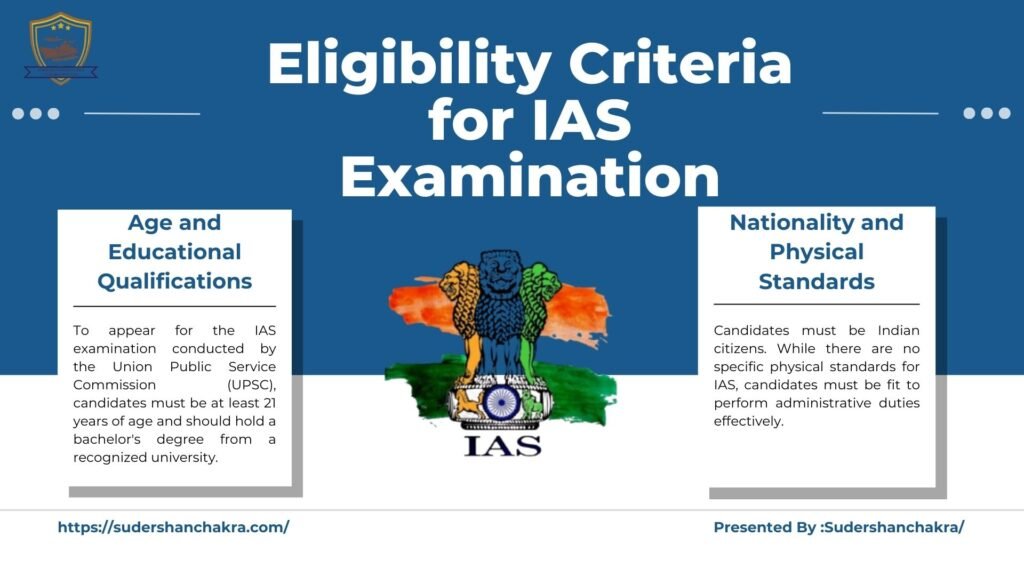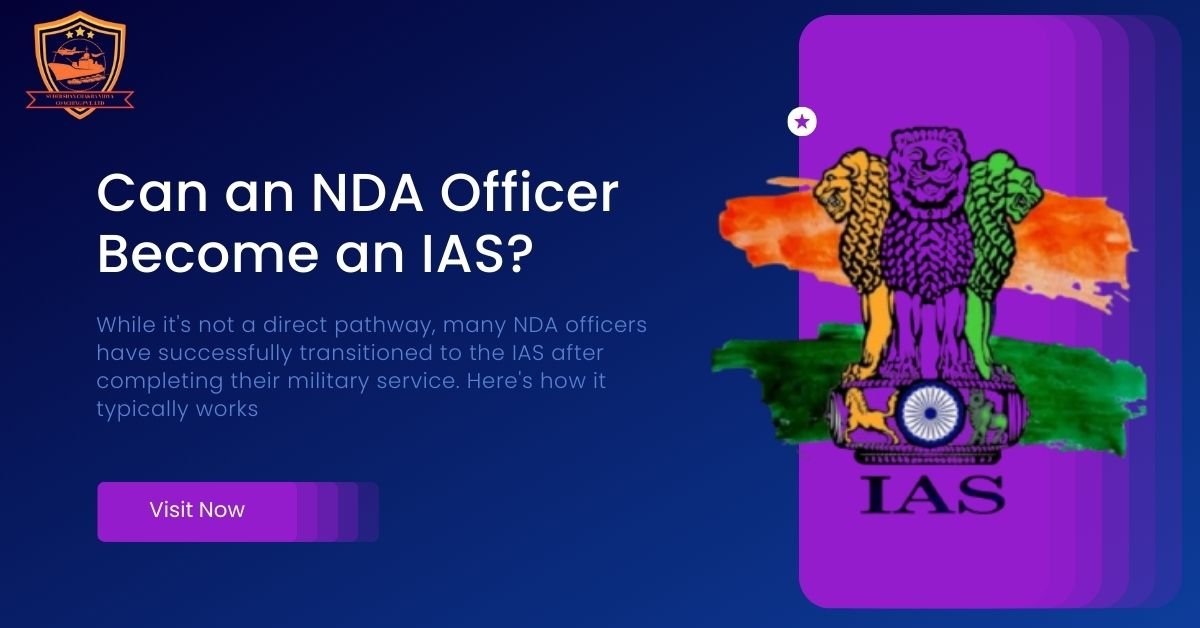Yes, an NDA officer can become an IAS officer.
While it’s not a direct pathway, many NDA officers have successfully transitioned to the IAS after completing their military service. Here’s how it typically works:
Introduction
The idea of serving the nation in more than one capacity is a noble aspiration that many young Indians hold. While the National Defence Academy (NDA) offers a pathway into the esteemed armed forces of India, the Indian Administrative Service (IAS) presents a different, yet equally impactful, opportunity for serving the public. But can an NDA officer really become an IAS officer? This question reflects the dreams and aspirations of many who are already committed to the country’s defense but wish to explore governance and administrative roles.
Understanding the Role of an NDA Officer
What is the NDA?
The National Defence Academy (NDA) is the joint services academy of the Indian Armed Forces, where cadets of the Army, Navy, and Air Force train together before they go on to respective service academies for further pre-commissioning training. NDA graduates are known for their rigorous training, discipline, and leadership qualities.
Responsibilities of an NDA Officer
NDA officers are primarily tasked with defending the nation. They are trained in combat skills, strategic planning, and various other aspects that are crucial to national security. Their duties include leading troops, planning military operations, and ensuring the safety and security of the nation against external threats.
Understanding the Role of an IAS Officer
What is the IAS?
The Indian Administrative Service (IAS) is a branch of the Indian Civil Services and one of the premier bureaucratic agencies in India. IAS officers are responsible for the administration of the government at various levels and play a vital role in policy formulation and implementation.
Responsibilities of an IAS Officer
IAS officers manage government affairs and are involved in the implementation of policies and programs. Their duties include advising ministers, managing government departments, and ensuring the enforcement of laws and regulations. They work on diverse issues ranging from health, education, and agriculture to infrastructure and national development.
Why an NDA Officer Might Consider Becoming an IAS Officer
Career Aspirations
Some NDA officers may aspire to broaden their scope of service. While the armed forces provide a direct way to serve the nation, civil services allow officers to influence policy decisions and work on developmental projects that can bring about significant societal changes.
Personal Goals and Public Service Motivation
The motivation to serve the public in different capacities often drives NDA officers towards a career in the IAS. By transitioning to an administrative role, they can address public concerns directly, contribute to policymaking, and ensure effective governance.
Eligibility Criteria for IAS Examination

Age and Educational Qualifications
To appear for the IAS examination conducted by the Union Public Service Commission (UPSC), candidates must be at least 21 years of age and should hold a bachelor’s degree from a recognized university. The maximum age limit varies with categories: 32 years for the general category, 35 for OBC, and 37 for SC/ST candidates.
Nationality and Physical Standards
Candidates must be Indian citizens. While there are no specific physical standards for IAS, candidates must be fit to perform administrative duties effectively.
Can NDA Officers Apply for the IAS Exam?
Rules Regarding Eligibility
Yes, NDA officers can apply for the IAS exam provided they meet the educational qualifications and age criteria. Being part of the armed forces does not restrict one from appearing for the civil services examination. However, an NDA officer must be willing to resign from their current service to take up a role in the IAS.
Possible Constraints
The major constraint for NDA officers is managing the time required for UPSC preparation while fulfilling their duties. Also, the decision to resign from the armed forces is significant and must be carefully considered.
Pathways for NDA Officers to Become IAS Officers
Resigning from the Armed Forces
The first step for an NDA officer interested in joining the IAS is to formally resign from the armed forces. This decision is crucial and must be taken after weighing the pros and cons, including career stability and personal satisfaction.
Completing the Required Education
Since a bachelor’s degree is a mandatory requirement for the IAS exam, NDA officers who have completed their degree can proceed to apply. Officers who do not have a degree may need to pursue further education to qualify.
Preparing for the UPSC Civil Services Exam
Overview of the UPSC Exam
The UPSC exam consists of three stages: Preliminary Examination (objective type), Main Examination (written), and Interview (personality test). The syllabus covers a wide range of topics, including history, geography, polity, economics, and general science, along with an optional subject.
Subjects and Syllabus for Preparation
NDA officers need to familiarize themselves with the vast syllabus of the UPSC exam. Standard books, coaching, and online resources can aid in preparation. Subjects like Indian polity, history, geography, and current affairs are crucial for the exam.
Challenges Faced by NDA Officers in the Transition
Differences in the Working Environment
The disciplined and regimented life of the armed forces differs significantly from the civilian administrative environment. NDA officers transitioning to IAS need to adapt to a more bureaucratic setting with different hierarchies and workflows.
Adapting to Civilian Life and Administrative Work
Transitioning to a civilian role may require a change in mindset. NDA officers might find it challenging to adjust to new roles that involve a lot of paperwork, policymaking, and dealing with political entities.
Advantages of NDA Officers Becoming IAS Officers
Leadership and Discipline
NDA officers bring a wealth of leadership skills, discipline, and a strong sense of duty to the IAS. These traits are valuable in administrative roles where decision-making and crisis management are critical.
Experience in High-Pressure Situations
Having managed high-pressure situations in the armed forces, NDA officers are well-equipped to handle emergencies and crises, making them suitable for administrative roles that require calm and composed decision-making.
Success Stories of NDA Officers Who Became IAS Officers
Case Studies and Examples
There have been several instances where NDA officers have successfully transitioned into IAS roles. Their experiences in the armed forces have given them a unique perspective, which they apply in governance and public administration.
How to Balance NDA Responsibilities While Preparing for IAS
Time Management Strategies
Balancing preparation with existing duties requires effective time management. Setting a study schedule, prioritizing tasks, and using leave efficiently can help NDA officers prepare without compromising their responsibilities.
Support Systems and Resources Available
Seeking support from family, mentors, and colleagues can be invaluable. Utilizing online resources, study groups, and coaching centers can also provide guidance and support during preparation.
The Importance of Networking and Mentorship
Building Connections with Former NDA Officers in Civil Services
Networking with former NDA officers who have joined civil services can provide valuable insights and advice. These connections can offer guidance on preparation strategies, career decisions, and personal development.
Role of Mentors in the Transition
Mentors can play a crucial role in guiding NDA officers through the transition process, offering advice on preparation, career choices, and personal development.
Final Steps Before Transitioning
Submitting Resignation
Before officially transitioning, an NDA officer must submit a formal resignation from their service. This step is crucial and must be followed by necessary administrative procedures.
Official Procedures and Documentation
Completing the required paperwork, notifying relevant authorities, and ensuring all official documentation is in order are essential steps in the transition process.
Conclusion
Transitioning from an NDA officer to an IAS officer is a challenging yet achievable goal. With the right preparation, mindset, and support, NDA officers can successfully make this shift, contributing to the nation’s development in a new capacity. If you are an NDA officer contemplating this path, remember that your training has already equipped you with many of the skills necessary to excel in civil services. Embrace the challenge and take the leap towards making a broader impact on society.
FAQs
- Can an NDA officer apply directly for the IAS exam?
Yes, an NDA officer can apply for the IAS exam, provided they meet the eligibility criteria set by the UPSC. - What qualifications are needed for an NDA officer to become an IAS officer?
The officer must hold a bachelor’s degree and meet the age criteria to be eligible for the IAS exam. - Do NDA officers have an advantage in the IAS exam?
While there is no formal advantage, the discipline, leadership, and decision-making skills developed during NDA training can be beneficial. - Is it difficult for NDA officers to transition to IAS roles?
The transition can be challenging due to the different nature of work, but with proper preparation and mindset, it is achievable. - How long does it take for an NDA officer to become an IAS officer?
The time required depends on factors such as preparation time for the UPSC exam, resignation process, and success in clearing the exam stages.
You May Also Like : CDS Written Exam Coaching, SSB Interview Coaching, NDA written Exam Coaching


